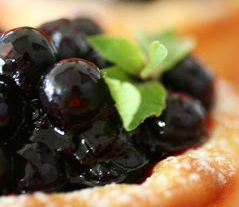 lueberries exposed to minimal heating and cooking offer greater health benefits than berries that are baked or cooked in a microwave, according to a new study published in the Journal of Berry Research.
lueberries exposed to minimal heating and cooking offer greater health benefits than berries that are baked or cooked in a microwave, according to a new study published in the Journal of Berry Research.Texas researchers measured the levels of beneficial phytochemicals in blueberries after putting them through a variety of cooking methods. They also examined the bioactive potential of wild blueberry extract after cooking using a cell-based culture assay.
"The point of the study was two-fold," said lead researcher Michael Grusak. "Because blueberries are touted as such a health-beneficial food, we wanted to know the nutrient content of blueberries after consumers cook them in a number of ways. But researchers are also beginning to use blueberries in clinical trials, so the information we gained from this study will be important to help researchers design better studies."
Blueberries offer a variety of health benefits, including improved heart health and a decreased risk of colon, breast, oral and prostate cancers.
The study measured phytochemicals in blueberries that are known to have beneficial health impacts: anthocyanin (ANC), proanthocyanidin (PAC) and chlorogenic acid (CA). All of the blueberries used in the study were the quick-frozen type found in the freezer section of grocery markets and commonly used in processed foods.
Phytochemicals in quick-frozen wild blueberries subjected to temperature fluctuations, which are often encountered during distribution and handling for retail sale, were measured. The ANC, PAC and CA levels dropped by about 8%, 43% and 60%, respectively, compared to quick-frozen blueberries stored continuously from harvest at minus 80 degrees Celsius. Baking, boiling and microwaving also reduced the levels of the compounds, with longer cooking times (three to five minutes of microwaving) leading to the biggest declines in the concentrations of these blueberry components.
Researchers also conducted cell-based assays to measure the antioxidant activity of blueberry extracts after various cooking methods. Antioxidants help to fight oxidative stress, a contributor to certain human diseases. Only microwaving for five minutes had a detrimental effect on the antioxidant capacity of the blueberries. Antioxidant activity was not reduced when using shorter microwaving times, baking or boiling.
"What we can say from this study is that cooking and heating, especially longer microwaving, does decrease the amount of beneficial compounds in the berries," Grusak said. "Minimal cooking would be ideal, but there are still measurable levels of health-beneficial components in blueberries, even after a variety of preparations."





